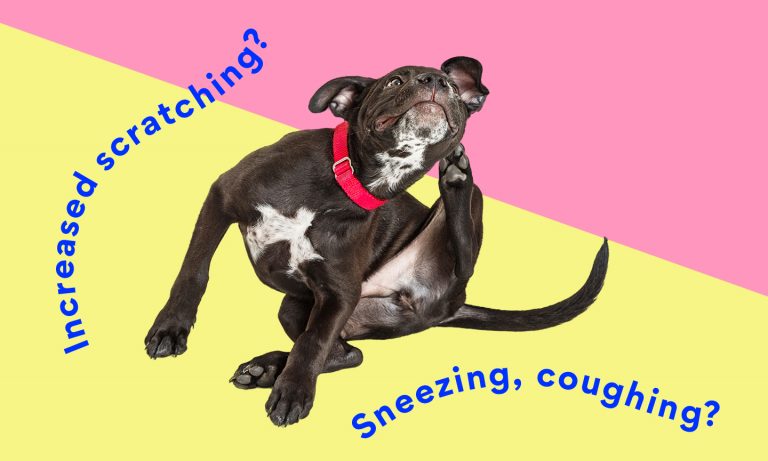It’s natural to want to spend more time outside when the weather warms up, but if you have seasonal allergies, all those plants in bloom will probably make you miserable. Dogs and cats suffer from seasonal allergies too, but their symptoms and vet-recommended prescription allergy treatments for pets are different. Here’s everything you need to know about cat and dog allergies and how to handle them.
Causes of Seasonal Cat and Dog Allergies
The Centers for Disease Control and Prevention (CDC) defines an allergy as “an overreaction of the immune system to substances [allergens] that generally do not affect other individuals.”
Seasonal allergies occur when someone reacts to allergens—like pollen—that are most present during particular times of the year. The situation in dogs and cats can get a little complicated, however, since cat and dog allergy symptoms may initially start out as seasonal, but can eventually become a year-round problem.
In pets, the biggest problems with seasonal allergies tend to be related to the skin.
Here are some common symptoms of cat and dog allergies.
Dog Allergy Symptoms
Common symptoms of seasonal allergies in dogs include:
- Itchy skin
- Excessive scratching, chewing and biting at the body
- Hair loss
- Hot spots (moist areas of hair loss and red skin)
- Scabs or crusty spots on the skin
- Frequent skin and ear infections
Cat Allergy Symptoms
Many of seasonal cat allergy symptoms are similar to those seen in dogs, but there are some differences:
- Itchy skin
- Excessive scratching, chewing and biting at the body
- Hair loss or bald spots
- Areas of red or pink skin that may be bumpy and raised
- Scabs or crusty spots, particularly under the chin
- Twitchy skin
- Recurrent skin and ear infections
How Can You be Sure It’s Seasonal Allergies?
The symptoms of seasonal dog and cat allergies can be seen with many other diseases as well, including bacterial infections, fungal infections, external parasites, autoimmune disorders and even some types of cancer.
To determine whether or not seasonal allergies are to blame for a pet’s symptoms, veterinarians first need to rule out other conditions. Doctors start this process with a complete health history and a physical examination, looking for evidence of fleas, lice, etc. They may also run some simple diagnostic tests, such as:
- Skin cytology to rule out bacterial and fungal infections
- A skin scraping to look for mange mites
- A fungal culture to diagnose ringworm
After this initial work up, veterinarians may recommend additional testing (e.g., a skin biopsy or a dietary trial to rule out food allergies), or they may feel that a diagnosis of seasonal allergies is appropriate.
Relieving the Symptoms of Seasonal Allergies in Pets
Seasonal allergies can treated in a variety of ways, but keep in mind that allergies cannot be cured, only managed.
Allergy shots or oral drops can desensitize pets to the allergens that trigger their symptoms. A veterinarian must first perform allergy tests to determine what the pet is allergic to, and can then order an appropriate allergy serum based on the results. Many pets will improve with desensitization therapy, but they may require lifelong treatment to prevent relapses.
Symptomatic therapy is another option for many cat and dog allergies. The following are some vet-recommended treatments for dog and cat allergies. Better results can be expected when several treatments are used at the same time.
- Whenever possible, limit exposure to your pet’s allergens by keeping windows closed, your pet inside, etc.
- Bathe your pet once or twice a week using a dog shampoo such as HyLyt hypoallergenic shampoo for dogs and cats. This will help remove allergens that are trapped in the fur.
- Oral omega-3 fatty acid supplements like Vetoquinol Care Triglyceride Omega and topical products like Dermoscent Essential 6 Spot-On for dogs may help improve the skin’s ability to act as a barrier to allergens.
- Some pet parents have had good luck with herbal products like Animal Essentials seasonal allergy herbal formula supplement.
- Acupuncture may help some pets with seasonal allergies.
- Antihistamines rarely offer enough relief from dog and cat allergy symptoms on their own, but they can help in conjunction with other therapies.
- A veterinarian may have to prescribe an allergy medicine for dogs and cats with severe symptoms. Prednisone (dogs), prednisolone, cyclosporine (Atopica®), and Apoquel® can all be good options depending on the specifics of the case.
Managing cat and dog allergies can be difficult. In addition to seasonal allergies, there are other pet allergies and pet health problems related to the skin that might need to be addressed. Talk to your pet’s veterinarian if you have any questions about your dog’s or cat’s well-being.
By: Dr. Jennifer Coates, DVM
Feature image: Veronika 7833/Shutterstock.com
More about pet allergies:
Share:













